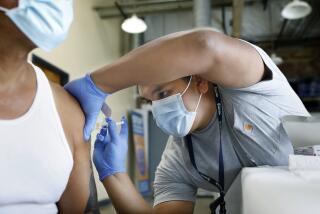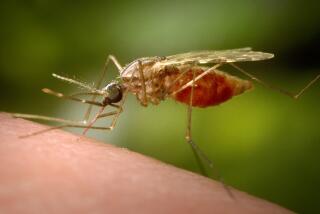Researchers Heartened by Early Tests of Potential AIDS Vaccine : Medicine: Evidence indicates a human immune response tested in mice can fight off deadly HIV virus.
- Share via
Early tests of a potential AIDS vaccine show evidence of a human immune response that can fight off the AIDS virus, researchers at a San Diego firm report.
The vaccine caused the immune systems of human volunteers to produce infection-fighting cells that, when transplanted into mice, kept the mice from being infected with the HIV virus, the scientists say.
These preliminary results at the Medical Biology Institute in La Jolla are considered important, not only because of the vaccine’s potential, but also because of its use of mice to safely assay the human immune response.
“This was a very, very exciting confirmation of the ability to use this experimental technology to be able to do in mice what you can’t do in human volunteers,” said Dr. David Katz, president of MBI.
One stumbling block in testing potential AIDS vaccines has been that the ultimate test of a vaccine’s effectiveness would expose the test subjects to a fatal virus.
In the fall of 1988, MBI announced that it had found a way to transplant human immune cells into mice that have no immune system of their own. Although the cells themselves function within the mice, there is disagreement over whether the procedure results in a fully active human immune system in the mice, or just mature immune cells.
A competing research group at Stanford University used human fetal tissue and surgery to get fully functioning human immune systems in similar mice.
The Medical Biology Institute vaccine work is part of tests being run nationwide by the National Institute of Allergy and Infectious Diseases.
The most promising results came from a Bristol-Myers/Squibb vaccine that uses the disabled smallpox virus, Mosier said. This virus, Vaccinia, is commonly used as a carrier for inoculation against other diseases, Mosier said.
In this case, the Vaccinia included a section from the HIV protein coat known as gp160. A control group of human volunteers received Vaccinia without the gp160 modification. Others were given only the gp160 protein itself, in a potential vaccine made by MicroGeneSys Inc. of Connecticut.
A third group received the gp160-modified Vaccinia as well as boosters with the gp160 protein.
Immune-system cells from the handful of volunteers who showed the greatest immune responses to the injections were then transplanted in the mice, and the mice were exposed to AIDS.
Five of six mice with immune cells from the control group showed HIV within those cells four weeks later. Of three mice receiving cells from a person who received only the gp160 protein, all became infected.
But, in the mice given immune cells from people who received both the modified Vaccinia and gp160 protein boosters, five of six mice showed no signs of infection by the AIDS virus, Mosier said.
Dr. James Kahn of the AIDS vaccine testing unit at UC San Francisco said the findings seem “exciting but very preliminary.”
Kahn said he would want to know how aggressively the La Jolla researchers looked for evidence of infection after the mice were exposed to HIV. It also would be important to know whether gp160 protein in the vaccines was from the same HIV strain to which the mice were exposed, he said.
Mosier said the same strain of virus was used both in the vaccine and the infection challenge. Standard culturing and nucleic acid tests for HIV were used to look for virus, he said, but incomplete tests on the mice two months after inoculation show some indications that HIV may be hiding elsewhere in the mice.
“It’s clear the vaccine had a striking effect, but I’m not 100% confident that it completely eliminates the virus,” he said.
The results have not been published, and their release is somewhat premature, Mosier and Katz agreed.
Mosier told scientists about the results at a Colorado meeting this month. There was consternation among federal vaccine testing officials this week when MicroGeneSys began announcing that its gp160 protein showed promise of being an effective vaccine against AIDS, Mosier said.
“This experiment is basically good news, but we’re muddling the message by bringing in this group that I don’t think is informative,” Mosier said.






